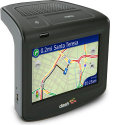GPS in all mobile devices by 2013?
Jan 30, 2008 — by LinuxDevices Staff — from the LinuxDevices Archive — 2 views Advances in GPS chipset development will allow integration of GPS in every mobile device within five years, claims a newly released report. Lower prices, GPS modernization, and new Global Navigation Satellite Systems (GNSS) will expand the market to 900 million units by 2013, ABI Research forecasts.
Advances in GPS chipset development will allow integration of GPS in every mobile device within five years, claims a newly released report. Lower prices, GPS modernization, and new Global Navigation Satellite Systems (GNSS) will expand the market to 900 million units by 2013, ABI Research forecasts.
(Click for larger view of Linux-based Dash Express navigation device)
In-car navigation will remain the most important application of GPS technology, ABI says, but the use of GPS in many other consumer, business, and industrial environments is expected to grow. Examples include telematics and asset tracking, digital cameras with automatic geo-tagging, and consumer devices with location-based social networking features.
 OpenMoko Neo FreeRunner |
According to a second ABI study on consumer navigation devices, handset-based navigation devices (such as OpenMoko's Linux-based Neo FreeRunner, pictured at right) will increasingly win market share from larger car-mountable personal navigation devices (PNDs), such as the new Linux-based Dash Express (pictured above). GPS-enabled handsets with navigation software are expected to achieve an annual sales volume of more than 96 million units by 2012, says the report.
The navigation-ready handsets will not displace PNDs, however, says ABI, and many consumers will buy both. Off-board navigation devices have been growing fast, with over four million paying subscribers in the U.S., says the study. However, factory-installed car navigation systems in the U.S. and Europe should increase gradually to 30 percent by 2012, reaching an annual volume of more than 10 million units.
Increasingly, it seems, the lines between in-car and personal navigation devices are blurring, with some car-mountable models small enough to carry in one's pocket. The same is happening between handsets and personal devices. For example, one of the most popular Linux-based devices equipped with GPS is Nokia's N810 Internet tablet, which lacks cellular capability, but can be used as a VoIP phone over WiFi connections.
Cheap, powerful GPS drives growth
Lower pricing from GPS chip vendors mentioned in the report — such as Broadcom, SiRF, and u-blox, along with many others — will be a major factor in market expansion, according to ABI. But, so will improved availability, reliability, and precision of GPS and other GNSS systems, such as China's Beidou (Big Dipper), the EU's Galileo, and Russia's GLONASS.
ABI Research principal analyst Dominique Bonte says, “Personal Navigation Devices for in-car use will be increasingly complemented by converged solutions based on GPS-enabled handsets for pedestrian navigation and location based services (LBS).” However, she adds, GNSS technologies will have to be combined with other positioning solutions, such as assisted GPS, dead reckoning, and WiFi, to address the issue of indoor coverage.
For example, the WiFi positioning system (WPS) from Skyhook Wireless works with Windows Mobile and was adopted earlier this week by Apple, via a firmware revision to its iPhone. Even without GPS hardware, Skyhook-enabled phones can calculate their positions by triangulation using a database of known cellular towers and WiFi access points.
Marine, avionics, military and surveying applications will also require supplementary technologies, such as laser or sonar, for improved precision and coverage. Therefore, specialists such as Garmin and Trimble will continue to successfully develop products for a wide range of applications and segments, Bonte says.
Availability
ABI's report, “Global Navigation Satellite Positioning Solutions,” is available here. The second ABI report, “Consumer Navigation Devices and Systems,” can be found here.
This article was originally published on LinuxDevices.com and has been donated to the open source community by QuinStreet Inc. Please visit LinuxToday.com for up-to-date news and articles about Linux and open source.